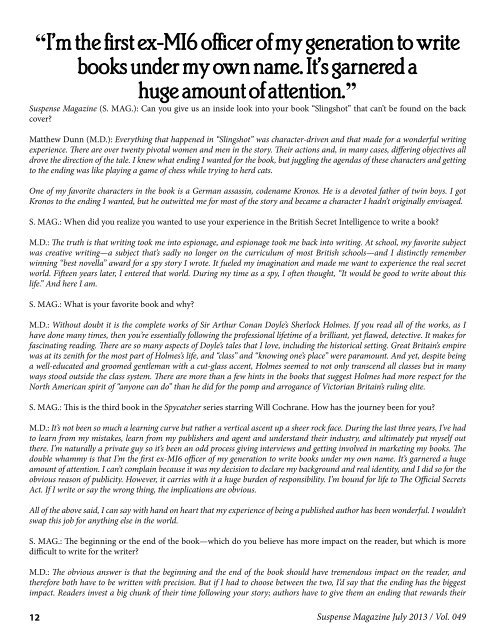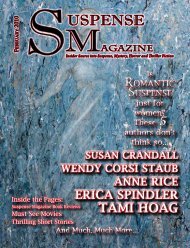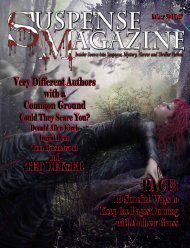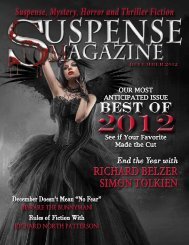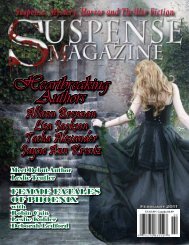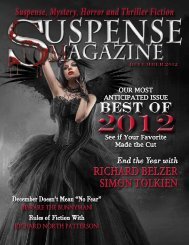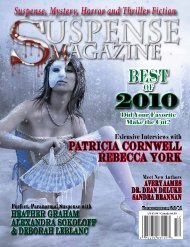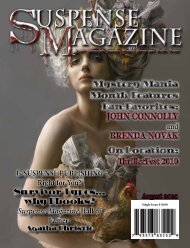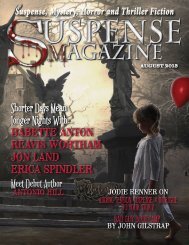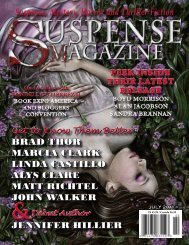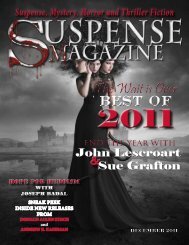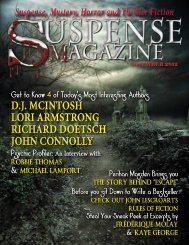Suspense Magazine July 2013
Suspense Magazine July 2013
Suspense Magazine July 2013
You also want an ePaper? Increase the reach of your titles
YUMPU automatically turns print PDFs into web optimized ePapers that Google loves.
“I’m the first ex-MI6 officer of my generation to write<br />
books under my own name. It’s garnered a<br />
huge amount of attention.”<br />
<strong>Suspense</strong> <strong>Magazine</strong> (S. MAG.): Can you give us an inside look into your book “Slingshot” that can’t be found on the back<br />
cover<br />
Matthew Dunn (M.D.): Everything that happened in “Slingshot” was character-driven and that made for a wonderful writing<br />
experience. There are over twenty pivotal women and men in the story. Their actions and, in many cases, differing objectives all<br />
drove the direction of the tale. I knew what ending I wanted for the book, but juggling the agendas of these characters and getting<br />
to the ending was like playing a game of chess while trying to herd cats.<br />
One of my favorite characters in the book is a German assassin, codename Kronos. He is a devoted father of twin boys. I got<br />
Kronos to the ending I wanted, but he outwitted me for most of the story and became a character I hadn’t originally envisaged.<br />
S. MAG.: When did you realize you wanted to use your experience in the British Secret Intelligence to write a book<br />
M.D.: The truth is that writing took me into espionage, and espionage took me back into writing. At school, my favorite subject<br />
was creative writing—a subject that’s sadly no longer on the curriculum of most British schools—and I distinctly remember<br />
winning “best novella” award for a spy story I wrote. It fueled my imagination and made me want to experience the real secret<br />
world. Fifteen years later, I entered that world. During my time as a spy, I often thought, “It would be good to write about this<br />
life.” And here I am.<br />
S. MAG.: What is your favorite book and why<br />
M.D.: Without doubt it is the complete works of Sir Arthur Conan Doyle’s Sherlock Holmes. If you read all of the works, as I<br />
have done many times, then you’re essentially following the professional lifetime of a brilliant, yet flawed, detective. It makes for<br />
fascinating reading. There are so many aspects of Doyle’s tales that I love, including the historical setting. Great Britain’s empire<br />
was at its zenith for the most part of Holmes’s life, and “class” and “knowing one’s place” were paramount. And yet, despite being<br />
a well-educated and groomed gentleman with a cut-glass accent, Holmes seemed to not only transcend all classes but in many<br />
ways stood outside the class system. There are more than a few hints in the books that suggest Holmes had more respect for the<br />
North American spirit of “anyone can do” than he did for the pomp and arrogance of Victorian Britain’s ruling elite.<br />
S. MAG.: This is the third book in the Spycatcher series starring Will Cochrane. How has the journey been for you<br />
M.D.: It’s not been so much a learning curve but rather a vertical ascent up a sheer rock face. During the last three years, I’ve had<br />
to learn from my mistakes, learn from my publishers and agent and understand their industry, and ultimately put myself out<br />
there. I’m naturally a private guy so it’s been an odd process giving interviews and getting involved in marketing my books. The<br />
double whammy is that I’m the first ex-MI6 officer of my generation to write books under my own name. It’s garnered a huge<br />
amount of attention. I can’t complain because it was my decision to declare my background and real identity, and I did so for the<br />
obvious reason of publicity. However, it carries with it a huge burden of responsibility. I’m bound for life to The Official Secrets<br />
Act. If I write or say the wrong thing, the implications are obvious.<br />
All of the above said, I can say with hand on heart that my experience of being a published author has been wonderful. I wouldn’t<br />
swap this job for anything else in the world.<br />
S. MAG.: The beginning or the end of the book—which do you believe has more impact on the reader, but which is more<br />
difficult to write for the writer<br />
M.D.: The obvious answer is that the beginning and the end of the book should have tremendous impact on the reader, and<br />
therefore both have to be written with precision. But if I had to choose between the two, I’d say that the ending has the biggest<br />
impact. Readers invest a big chunk of their time following your story; authors have to give them an ending that rewards their<br />
12 <strong>Suspense</strong> <strong>Magazine</strong> <strong>July</strong> <strong>2013</strong> / Vol. 049


